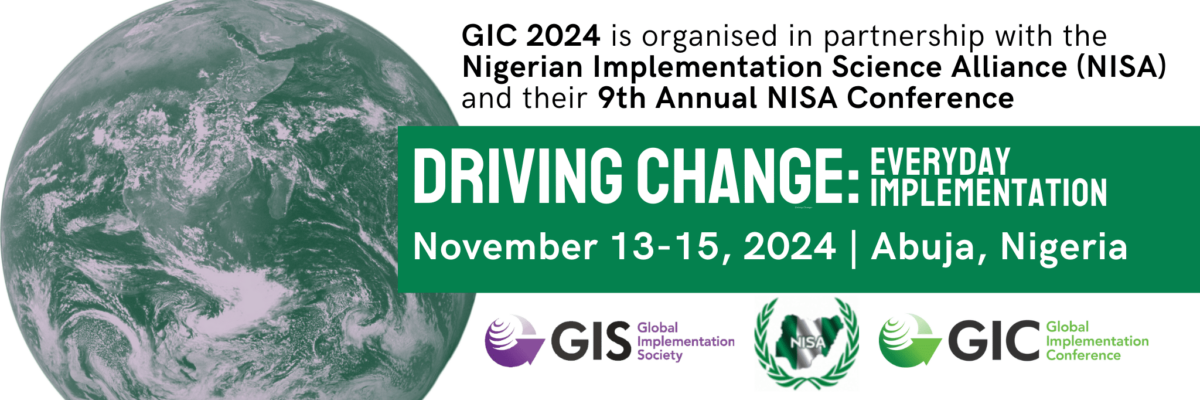About GIC 2024
About GIC 2024

The conference in 2024 is a special edition of the Global Implementation Conference. For the first time, GIC 2024 is being produced in partnership with the Nigeria Implementation Science Alliance (NISA). Each year, NISA hosts an Annual Conference in Abuja for which 2024 is the 10th Annual Conference. As such, both NISA and GIS thought 2024 would be ther perfect year to bring the two organisations together to continue moving the field of implementation science forward!
Since the start of the Covid-19 Pandemic in 2020, we have all seen the importance of building sustainable systems and communities firsthand. In 2021, GIC was held virtually to discuss many of the issues we are still facing today. The implementation gap between research and reality is more present now than ever. With our colleagues at NISA we hope to bring new voices to the table so we can better understand what is needed to both widely adopt evidence-based practices and engage frontline practitioners in the work of advancing the field. The 2024 NISA & GIS Conference aims to tackle these questions and topics head-on.
Across the world, governments, academia, intermediaries, and service systems are concerned with optimizing the health and wellbeing of local populations. With the global evolution of the field of implementation science and practice, there has been considerable learning and experience on how to maximize the full and effective use of evidence-informed innovations relating to human services across fields (e.g. health, education, social welfare). These efforts and advances offer insights for all in how to bridge the implementation gap to achieve and sustain desired positive impacts for individuals and communities.
The GIC is one of the world’s leading implementation conferences. It aims to promote implementation practice, science and policy and their active application in human services in order to contribute to demonstrable and socially significant benefits to people and society. The conference theme for 2024 will be Driving Change: Everyday Implementation.
Building Capacity in Research, Practice, and Policy Across the Globe, Previous GIC Conferences have engaged over 500 delegates from 25 countries representing multiple disciplines. With a focus on everyday implementation and highlighting the need for accessibility, GIC 2024 will continue to engage the expanding global implementation community through dialogue and discussion on cutting edge implementation research and real-world examples of achieving impact, guided by effective implementation in diverse contexts.
GIC 2024 will be hosted in-person by the Nigeria Implementation Science Alliance and the Global Implementation Society on November 13 – 15, 2024 in Abuja, Nigeria. The program will include a blend of plenary presentations, panel discussions, interactive workshops, and networking events.
Audience
Our conference audience includes individuals and organizations that use, evaluate, support, and promote effective implementation practices. The core audience for the GIC include the “changemakers” within systems, including implementation specialists, applied researchers, quality improvement managers, purveyors, intermediaries, implementing organizations, implementation networks, funders, policy makers, decisions makers, and students. The GIC emphasizes the application of implementation science and effective implementation practices at its core, with implementation research serving a foundational role in the translation of evidence to effective implementation practices.
Conference Aims
GIC 2024 will engage the expanding global implementation community through dialogue and discussion on cutting edge implementation research and real-world examples of achieving impact, guided by effective implementation. Additionally, we are making extended efforts to engage policymakers in this years conference so they may have the chance to learn more about the importance of adopting EBPs in the policies that affect us all.
The Program Planning Committee for GIC 2024 is committed to developing a conference program that includes diverse perspectives and experiences, spanning implementation fields, disciplines, and geographic and economic contexts.